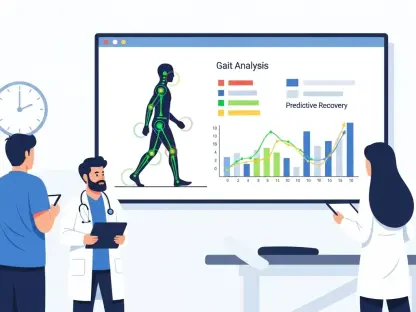In an era where healthcare systems face unprecedented challenges, from rising costs to complex patient needs, clinical pharmacists have emerged as vital contributors to improving medical quality on a global scale, with their expertise extending far beyond the traditional role of dispensing medications. Their work now includes direct patient care, safety monitoring, and even shaping health policies. A recent editorial in Frontiers in Pharmacology, titled “Clinical Pharmacist Service Promotes the Improvement of Medical Quality, Volume II,” highlights this transformation through 52 peer-reviewed studies drawn from diverse regions such as China, Ethiopia, Germany, Brazil, and Turkey. The remarkable increase in research submissions—up from 27 in the first volume to 115 in the latest—signals a growing worldwide recognition of their indispensable impact. These studies reveal clinical pharmacists working across a spectrum of environments, from cutting-edge hospitals to resource-scarce settings, addressing unique challenges with innovation and dedication. Their efforts are not just academic; they translate into tangible benefits like shorter hospital stays, safer treatments, and better patient outcomes. This exploration delves into the myriad ways clinical pharmacists are reshaping healthcare, offering a glimpse into their critical roles in medication management, safety protocols, research, education, and policy advocacy. It’s a narrative of adaptability and progress, showcasing how these professionals are at the forefront of enhancing care delivery across the globe.
Enhancing Patient Outcomes Through Medication Management
Clinical pharmacists play a pivotal role in optimizing medication therapy, ensuring patients receive treatments that are both effective and safe. Their hands-on involvement in patient care is evident in specialized fields like transplant medicine, where their interventions have significantly improved drug level precision for kidney transplant recipients. By fine-tuning dosages and monitoring responses, they help prevent complications and support better recovery outcomes. This meticulous approach is particularly crucial in high-stakes scenarios where even minor errors can have serious consequences, demonstrating how their expertise directly enhances patient well-being in complex medical situations.
In regions with limited resources, such as parts of Ethiopia, clinical pharmacists tackle pressing issues like drug-related problems in hospital wards. Their ability to identify and resolve discrepancies in prescriptions has led to widespread acceptance of their recommendations by physicians, resulting in improved health outcomes and notable cost savings. This impact is especially significant in environments where access to advanced tools or additional staff is constrained, highlighting how their problem-solving skills adapt to local challenges. Their work in these settings underscores a fundamental truth: even with minimal resources, strategic interventions by pharmacists can yield substantial benefits for patient care and system efficiency.
A critical area of focus is anticoagulation management, where clinical pharmacists address persistent challenges like suboptimal warfarin control in outpatient settings. Studies from Ethiopia reveal that factors such as concurrent aspirin use or underlying heart conditions often complicate treatment, leading to potential risks. Pharmacists step in to bridge these gaps by providing tailored guidance and monitoring, ensuring safer therapy for vulnerable patients. Their role in this domain exemplifies a broader commitment to personalized care, where understanding individual patient factors is key to preventing adverse events and fostering trust in medical interventions.
Leveraging Technology for Precision and Efficiency
The integration of technology into pharmaceutical care marks a transformative shift, with clinical pharmacists at the forefront of this evolution. Machine learning and advanced analytics are being harnessed to optimize surgical prescriptions, leading to shorter hospital stays and reduced healthcare costs. These data-driven tools enable pharmacists to predict and mitigate risks, such as cancer-associated blood clotting disorders, before they escalate. This proactive approach not only enhances patient safety but also streamlines hospital operations, demonstrating how technology amplifies the impact of pharmaceutical expertise in modern healthcare settings.
Personalized medicine represents another frontier where clinical pharmacists are making significant strides through technology. By employing pharmacogenomics, they tailor treatments to individual genetic profiles, particularly for mental health conditions like major depressive disorder. This method has shown promising results in improving medication adherence, as patients receive therapies suited to their unique needs. Additionally, precision dosing strategies for psychiatric medications ensure effectiveness while minimizing side effects, reflecting a nuanced understanding of patient variability. Such innovations highlight how pharmacists are redefining care delivery, moving beyond one-size-fits-all solutions to offer customized interventions that resonate with patient-specific requirements.
Strengthening Medication Safety and Pharmacovigilance
Medication safety remains a cornerstone of clinical pharmacy, with pharmacists acting as essential safeguards against adverse drug events. In advanced systems like those in Germany, clinical decision support technologies generate alerts for potential issues, though many are irrelevant, requiring pharmacists to apply critical judgment in comprehensive reviews. Their ability to filter through data ensures that only genuine risks are addressed, preventing unnecessary interventions while protecting patient health. This balance of technology and human insight is vital in maintaining high safety standards within complex healthcare environments.
In more specialized settings, such as neonatal intensive care units in Brazil, clinical pharmacists utilize trigger tools to detect adverse events linked to factors like prematurity or extended hospitalizations. Their timely interventions help mitigate risks for some of the most fragile patients, ensuring that potential harms are identified and addressed early. This focused application of pharmacovigilance illustrates their adaptability, as they tailor safety protocols to the unique needs of specific populations. Beyond immediate care, their work contributes to broader safety data, informing practices that can prevent future incidents across diverse clinical contexts.
Real-world evidence further underscores their impact on drug safety. Large-scale studies reveal critical insights, such as the low adverse reaction rates of certain injections or heightened risks associated with specific cancer therapies in particular demographics. Clinical pharmacists analyze these findings to guide safer prescribing practices, ensuring that treatments are both effective and secure. Their role in synthesizing and applying such data is indispensable, as it directly influences clinical decision-making and enhances the overall reliability of therapeutic approaches in varied healthcare landscapes.
Advancing Research Through Clinical Trials
Though not yet a dominant focus, the involvement of clinical pharmacists in clinical trials represents a promising and growing area of contribution. Their expertise is leveraged across the trial lifecycle, from designing protocols and formulating dosing regimens to managing investigational products and documenting adverse events. This comprehensive engagement ensures that trials are conducted with precision and integrity, ultimately improving the quality of research outcomes. Their presence in this domain adds a layer of pharmaceutical insight that is critical for translating experimental therapies into safe, effective clinical applications.
Specific studies highlight the tangible benefits of their participation. For instance, comparisons of anesthesia drugs for older patients have identified safer options, while early-phase trials for conditions like Parkinson’s disease psychosis have confirmed favorable drug profiles under pharmacists’ oversight. These examples demonstrate how their involvement can directly influence patient safety and treatment efficacy within research settings. However, the limited number of studies in this area suggests an opportunity for greater engagement, as expanding their role in trials could further elevate the standards and impact of medical research globally.
Shaping Future Professionals and Patient Behaviors
Education and counseling form a vital part of clinical pharmacists’ contributions, as they shape both future practitioners and patient outcomes. Among pharmacy students in China, there is a clear preference for case-based learning facilitated by clinical instructors, which equips them with practical skills for real-world challenges. This hands-on approach fosters a deeper understanding of patient care complexities, preparing a new generation of pharmacists to address evolving healthcare needs. Their role in education extends beyond technical training, instilling a mindset of continuous improvement and adaptability in the profession.
On the patient side, counseling by clinical pharmacists significantly influences adherence and health outcomes. In Ethiopia, cardiovascular patients often face barriers to following treatment plans due to factors like advanced age or managing multiple medications. Pharmacists provide targeted guidance to overcome these hurdles, fostering better communication and trust. This personalized interaction not only improves compliance but also empowers patients to take an active role in their health management. Their efforts in this sphere underscore a dual commitment to professional development and patient empowerment, ensuring lasting impacts on healthcare quality at both systemic and individual levels.
Pioneering New Therapeutic Horizons
Clinical pharmacists are increasingly venturing beyond traditional roles to explore novel treatment targets, expanding their influence into cutting-edge research. Studies focusing on conditions like hepatocellular carcinoma and chronic obstructive pulmonary disease have identified potential biomarkers and therapeutic strategies, pushing the boundaries of conventional pharmacy practice. This exploratory work, while not central to daily hospital duties, signals a shift toward a broader scientific role, where pharmacists contribute to foundational discoveries that could redefine treatment paradigms in the coming years.
Their research efforts also encompass experimental and epidemiological analyses, such as investigating neuroprotective effects in brain injuries or linking specific biological ratios to reduced risks of cardiovascular diseases. These initiatives showcase a willingness to engage with complex, multidisciplinary challenges, leveraging advanced methodologies like multi-omics to develop predictive models. Though these contributions may not immediately translate to bedside care, they lay the groundwork for future innovations, illustrating how clinical pharmacists are not just responders to current needs but also architects of tomorrow’s medical advancements.
Influencing Policy and Economic Sustainability
The intersection of clinical pharmacy with health policy and cost-effectiveness is a relatively new but impactful domain. In China, national health insurance policies have increased access to certain cancer treatments, yet disparities in implementation persist, prompting pharmacists to advocate for equitable solutions. Their involvement in policy discussions ensures that pharmaceutical perspectives inform systemic changes, addressing gaps in access and affordability. This advocacy is crucial for integrating pharmacy services into broader healthcare frameworks, ensuring they are recognized as essential components of quality care.
Economic analyses further reveal the nuanced role of pharmacists in healthcare sustainability. Cost-effectiveness studies show regional variations, with some cancer therapies deemed affordable in China but not in the United States, highlighting the importance of context-specific evaluations. Pharmacists provide critical insights into these disparities, guiding decision-makers on resource allocation and reimbursement models. Additionally, surveys indicate that while inpatient awareness of clinical pharmacy services remains low, there is a willingness to pay if supported by insurance, pointing to a need for policy reforms. Their contributions in this area emphasize a commitment to not just clinical excellence but also the long-term viability of healthcare systems worldwide.
Reflecting on Global Impact and Future Directions
Looking back, the extensive body of research captured in the recent editorial reveals how clinical pharmacists have reshaped healthcare delivery across diverse global landscapes. Their interventions have consistently improved therapeutic outcomes, from transplant wards to community clinics, while their focus on medication safety has prevented countless adverse events through vigilant monitoring and data analysis. The adoption of technologies like machine learning has marked a turning point, enabling precision care that saves lives and reduces costs.
Moving forward, the path for clinical pharmacists involves amplifying their presence in underrepresented areas like clinical trials and policy advocacy. Expanding research through multicenter studies could strengthen the evidence base for their impact, while deeper engagement in education might address knowledge gaps in both professionals and patients. Addressing disparities in resource-limited settings and pushing for systemic integration via insurance and awareness campaigns stand as actionable next steps. Their journey reflects a dynamic balance of addressing immediate needs and envisioning long-term advancements, ensuring that healthcare quality continues to benefit from their evolving expertise.









